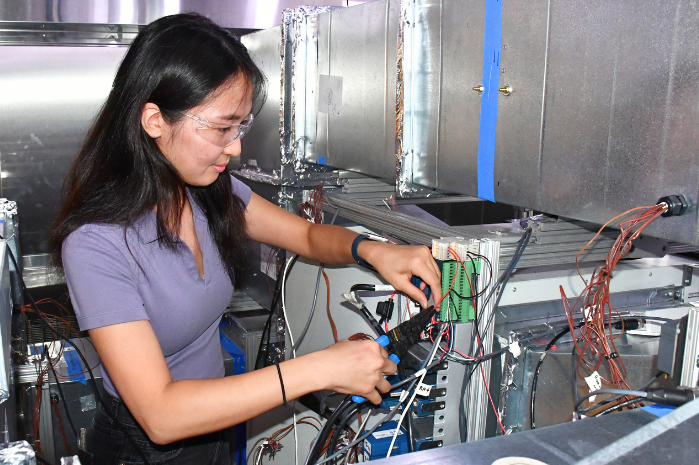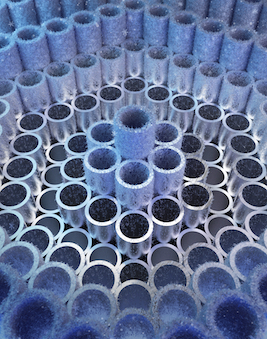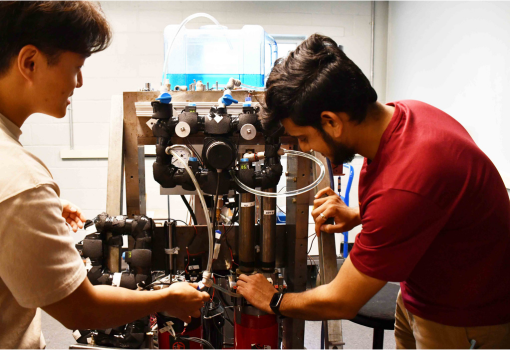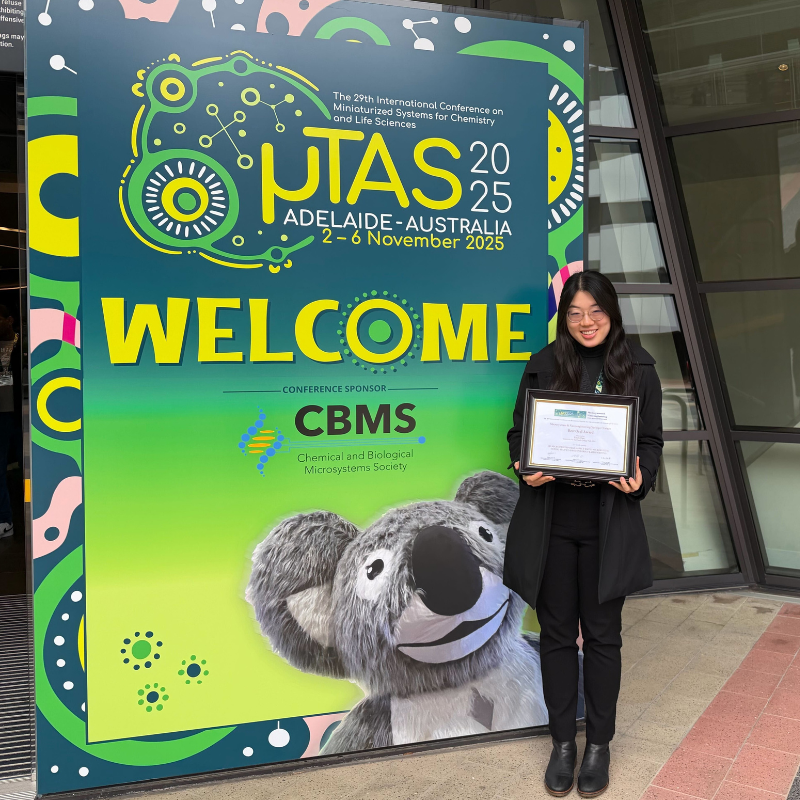News Story
DOE Ups Its Investment in UMD to Develop Eco-Friendly Heat Pumps
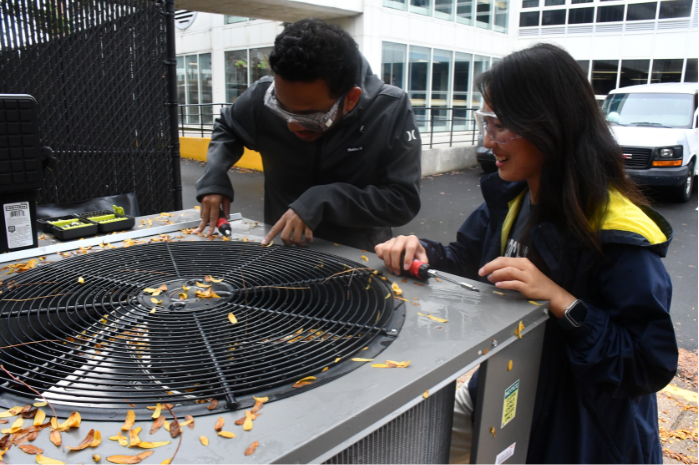
Mehrab Hossen Siam and Dana Kang are among the CEEE graduate students developing a cold-climate heat pump that would expand the use of this eco-friendly technology.
The U.S. Department of Energy (DOE) recently increased its investment in the University of Maryland for the development of eco-friendly heat pumps that reduce U.S. reliance on fossil fuels. On September 17, DOE announced that it will award $2.5 million to the University of Maryland (UMD) and collaborators to implement technology that addresses safety and performance concerns for heat pumps using refrigerants that are environmentally friendly but flammable. The announcement comes on the heels of DOE officially releasing funding to the university for a $2.3 million award to develop cold-climate heat pumps using refrigerants with low Global Warming Potential (GWP). That award was announced last year and is now officially funded.
Both projects are supported by DOE’s Buildings Energy Efficiency Frontiers and Innovation Technologies (BENEFIT) program, which aims to decarbonize buildings, reduce peak demand on the electric grid and lower energy costs by supporting new innovations and making existing technologies more accessible.
The UMD research team that will tackle these projects is a collaboration between the Center for Environmental Energy Engineering (CEEE) and the Department of Fire Protection Engineering (FPE). CEEE Director Reinhard Radermacher, Co-Directors Yunho Hwang and Vikrant Aute and FPE Professor Peter B. Sunderland will lead the UMD portion of the projects. Both projects will tap into the expertise of researchers in CEEE’s Consortium for Energy Efficiency and Heat Pumps.
“Heat pumps play an important role in decarbonizing the heating, ventilation and air conditioning (HVAC) segment,” says Hwang. “With both of these DOE projects, CEEE will help innovate heat pumps that can safely take advantage of environmentally friendly, but flammable, refrigerants, furthering the sustainability of this technology.”
Safety and Performance Measures
The newly announced DOE project will address performance and safety concerns for implementing electric heat pumps that use eco-friendly, flammable refrigerants. Heat pumps use electricity – reducing our reliance on fossil fuels – but they currently rely on refrigerants that are potent greenhouse gases, meaning heat pumps still have an environmental cost.
“Most of the working fluids currently in use for HVAC systems have a high GWP,” says Sunderland. “The next generation of working fluids addresses this, but are flammable. These fluids cannot be used safely with current HVAC systems because the working fluid flows between the outdoor and indoor units, whereby the working fluid can leak indoors and ignite. This hazard can be reduced by keeping the flammable working fluid outdoors, with a secondary loop of water transferring heat between the indoor and outdoor units. Such systems are called Air-to-Water Heat Pumps (ATWHPs).”
The Air-Conditioning, Heating and Refrigeration Institute, the project’s principal investigator, will collaborate with UMD and Oak Ridge National Laboratory. The research will focus on ATWHP technologies and will support the advancement of ultra-low-GWP refrigerants. “This project will address two impediments to the widespread adoption of ATWHPs,” Sunderland says. “First, there is a lack of a standardized method to assess ATWHP performance. Second, there is a need for clear safety measures in testing, installing, operating, servicing and repairing these products.” CEEE will identify technical requirements needed to resolve code updates and other potential deployment barriers for next-generation heat pumps, and will prepare detailed test facility considerations for working with low GWP refrigerants.
The project is part of a DOE BENEFIT 2024 investment of $38.8 million for 25 projects across 17 states. "The BENEFIT 2024 projects will accelerate our progress toward DOE's building decarbonization blueprint goal of reducing 65% of building emissions by 2035 and 90% of building emissions by 2050," says Jeff Marootian, principal deputy assistant secretary for the DOE’s Office of Energy Efficiency and Renewable Energy.
Cold Climate Heat Pumps
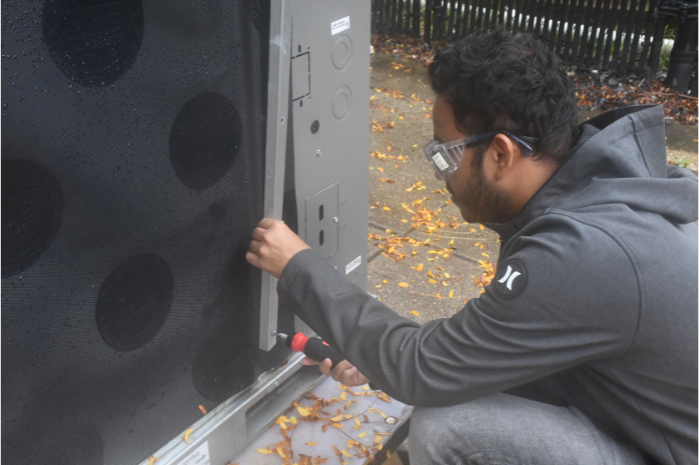 Mechanical engineering Ph.D. student Mehrab Hossen Siam is helping to develop a heat pump that uses refrigerants with ultra-low Global Warming Potential.
Mechanical engineering Ph.D. student Mehrab Hossen Siam is helping to develop a heat pump that uses refrigerants with ultra-low Global Warming Potential. The new award announcement came just after DOE officially approved funding for a BENEFIT project previously announced in which the UMD CEEE/FPE team will lead a collaboration with government and industry to design a cold-climate heat pump rooftop unit that uses ultra-low-GWP refrigerants and advanced compression techniques to enable low-temperature heating capacity. Electric heat pump sales have surged in recent years, partly due to a global push toward electrification. But the technology struggles to perform in cold climates, limiting its use.
UMD researchers in collaboration with the National Renewable Energy Laboratory will design, develop, fabricate and test a smart rooftop cold-climate heat pump system using a low-GWP refrigerant. Industry partners Rheem Manufacturing Company and Copeland will provide equipment and parts. "This project will facilitate the widespread adoption of heat pumps in northern states like New York, expanding their use beyond the southern U.S.” says CEEE’s Hwang. “Additionally, it will promote the use of low-GWP refrigerants. We're proud to be at the forefront of this initiative."
Published September 26, 2024


